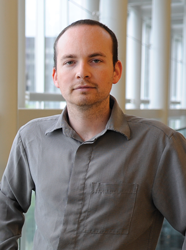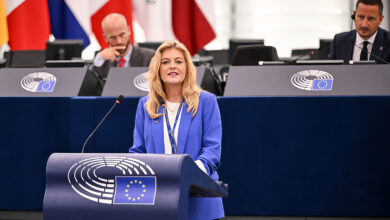A socialist Europe
 Moving beyond protest politics and creating “a mass party of the left” are two of Paul Murphy’s aims. In a continuation of eolas’ series of interviews, Meadhbh Monahan speaks to the Socialist Party MEP.
Moving beyond protest politics and creating “a mass party of the left” are two of Paul Murphy’s aims. In a continuation of eolas’ series of interviews, Meadhbh Monahan speaks to the Socialist Party MEP.
“We want ordinary people to have political power as opposed to the representatives of big business and we want the key sections of the economy to be publically owned and controlled,” begins 28-year-old Paul Murphy. “That’s very much a minority view at the moment,” he admits, even among those currently protesting against the €100 household charge.
The referendum on the EU Fiscal Compact Treaty will be “crucial” and represents a “huge battle” about what direction Europe takes, he believes. Article 3 of the treaty will impose a structural deficit target of 0.5 per cent of GDP “which means that … if they give us to 2015, it would mean €5.7 billion extra in cutbacks. If they give us until 2017, it will be €2 billion each year.” Murphy believes: “It’s not just morally wrong, but it will be devastating for the economies across Europe to do that in a synchronised way.” He intends to use the European Parliament as “a platform to speak out against it.”
He also opposes the ‘six-pack’ on economic governance i.e. the reinforced Stability and Growth Pact that obliges the 25 countries that have signed it to keep their budget deficits below 3 per cent of GDP and government debt below, or declining towards, 60 per cent of GDP. When asked for his alternative to the EU and austerity, Murphy replies: “They like to paint those of us who are opposed to the European Union as narrow nationalists or isolationists. There is a campaign of fear at the moment suggesting that if Ireland is to reject this referendum that we will be out of the euro and out of the EU; that’s just not true. It’s a lie designed to scaremonger people.” Rather, “rejecting the treaty will open up a discussion across Europe about what kind of Europe we want and that’s the kind of debate and struggle that we need.”
His vision is “a socialist Europe which is based on the interests of ordinary working people across Europe unlike [currently] where we have an undemocratic situation with the unelected Commission and the European Central Bank.”
Murphy maintains that “power is being shifted from elected governments – which can be influenced by protest and strikes – away from the people to make sure the austerity is implemented.” Power lies with the European Commission and the European Round Table of Industrialists (ERT) “which is the most powerful lobby group for big business in Europe,” he states. “These people shouldn’t have that power. The key sectors of the economy should be brought into democratic public ownership.”
Looking towards 2014, the reluctant politician seeks a “fundamentally different kind of Europe.” He expects to see a “fight-back” across Europe (including in Ireland). The Socialist Party’s role is to “connect those struggles.” This is about “ordinary people across Europe with common interests against the bankers, the speculators, the rich who are causing this crisis and are making us have all this pain.” Murphy admits he is “for a Europe” as it makes sense to co-operate on a continent-wide basis. However, at the moment, he claims “that co-operation is on the basis of what’s in the interest of European big business.”
Beyond protest?
Protest politics are “effective” and “will have a role to play in the next number of months.” However, the Socialist Party wants to “go beyond that”. Murphy insists: “That does not mean entering into coalition government with Labour and [Fine Gael] and managing capitalism. We want society to be fundamentally changed.”
Part of this is to redefine the left in Irish politics by developing “a mass party of the left.” By joining the United Left Alliance and campaigning against the household tax, the party hopes “to lay the basis for a broad left-wing political formation that people can feel is their party and that becomes a major force in Ireland in the future.” Murphy explains: “The Socialist Party is a particular current within that and we don’t see ourselves dissolving but being part of the process of building a new party.” The “massive crisis in capitalism” and Labour no longer being seen as a party of the left means that “the prospects for that are good.” Murphy says that people are seeing the same austerity and cutbacks from all governing parties. “They are nervous about fundamental radical change in society but also are increasingly open to at least thinking about the left.”
Murphy readily admits that he doesn’t have any long-term political ambitions. “I never envisioned myself being an MEP, that’s not where I envisaged to be in my life. It’s a product from my campaigning on various issues and it made sense for me to take over from Joe,” he says. “If I was to lose the election in the next few years, it would be a blow to the party in terms of representing the people and would be a blow to the work we are trying to do internationally but on a personal level, would it bother me? Not really.”
His over-riding ambition is to “continue the struggle in one way or another for the interests of ordinary people in Ireland but also abroad because I very dearly believe that these problems are going to persist until we change society so I am fighting for socialism against a capitalist system.”
| Profile: Paul Murphy MEP
Age 28, Murphy became politically aware in his teens when he campaigned for “a decent minimum wage” and calling for the freeing of Mumia Abu-Jamal, a black rights activist on death row in US. Whilst studying law at UCD, he helped to lead the Free Education for Everyone campaign and campaigned against the war in Iraq. He began studying for a masters in ‘law in a socialist society’ and took part in various protests such as Shell to Sea before becoming Joe Higgins’ political advisor in 2009. Murphy also sits on the International Trade Committee where he has been campaigning against free trade agreements with India, Colombia (where trade unionists have been killed by the army and paramilitaries) and Canada. He took part in the two flotillas to Gaza in January and November last year, spending one week in an Israeli jail on the second occasion along with other campaigners. In his spare time Murphy likes running. He is currently reading ‘The New Old World’ by Perry Anderson. |





